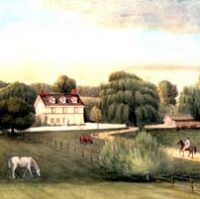The name of Charles Thomson is among the 1785 list of those twenty-three founders of the Philadelphia Society for Promoting Agriculture. Thomson was born in Northern Ireland, was orphaned on the voyage to America at age about 11 and subsequently either given or sold to a blacksmith in Delaware. Understanding what it was not to be a free person, he ran away – this, his first impression of a belief in the abolition of slavery – and found his way to the school of Dr Francis Alison in New London, Pennsylvania, where he received a basic education in Greek and Latin – which would serve him well in later life – and mathematics. He became a teacher in Philadelphia at the “Academy” – now the University of Pennsylvania – and in the Quaker schools in Philadelphia, where he was the headmaster of the Latin School as a young man in his 20’s, amidst the growing influence of the movement toward abolition.
Thomson left teaching about 1759 and entered the business world as an importer of dry goods, as a business manager of the Batsto Iron Works of New Jersey, and as a Philadelphia distiller of rum and cordials which was claimed to be “as good as any Jamaican Rum”. In the late 1760’s/early 1770’s Thomson became politically active in Philadelphia helping to organize the non-importation activities of English goods and as a member of the Committees of Correspondence.
In1774, two important life events took place which curiously seem to have led to Thomson’s growing interest in agriculture as America’s principal industry. He was married on September 1st to a Philadelphia gal named Hannah Norris, thus becoming the owner of Hannah’s substantial farm and estate called “Harriton” in today’s Bryn Mawr, PA., and second, he was called just four days later to become the Secretary of the newly formed Continental Congress, a post which he served through the Second Congress and the Confederation Congress of the 1780’s. He was the one person who saw every single day of the Congresses until his resignation upon the inauguration of George Washington as the first President of the United States, and he was the designer of the Great Seal of the United States. When Congress was in Princeton during the summer of 1783, Thomson roomed at the home of fellow Society founder and agriculturalist George Morgan. He wrote to Hannah every day and even included drawings of a new “Bee house” for his apiary at Harriton, admonishing his farmers to be more careful with his bees, and described how “when all of this is resolved [Congress] you and I shall derive much pleasure and an income from our farm”.
Although a founder of the Society, Thomson was not very active in its affairs, being wholly caught up in the machinations of government in New York until his retirement in 1789. He was, however, familiar with the work of British agriculturalist Arthur Young, and in 1786 he wrote and published a little book titled Notes on Farming, advocating the composting of manures and animal bedding, the rotation of crops, the sowing of lime, and the management of honeybees.
Upon his retirement from government in 1789, Thomson turned his attentions to the progressive management of his farm and orchards and a return to his classical studies. Thomson “let my farm out on shares” which we believe was a form of profit sharing with his workers. He raised small grains, livestock, and honeybees, and he had large orchards. In a return to his classical studies, Thomson completed the first translation of the Septuagint or Greek Old Testament, which he described “as an amusement for my mind”, and had it published in Philadelphia by a woman, Jane Aitken. Thomson died in 1824; the farm remained in Hannah’ family until 1927 and was last used as the high-end Harriton Guernsey Dairy. The historic house is open to the public today by appointment.
Bruce Cooper Gill
515 Old Lancaster Rd
Haverford, PA 19041
PSPAMember and former Executive Director of Harriton House, Bryn Mawr, Pa

